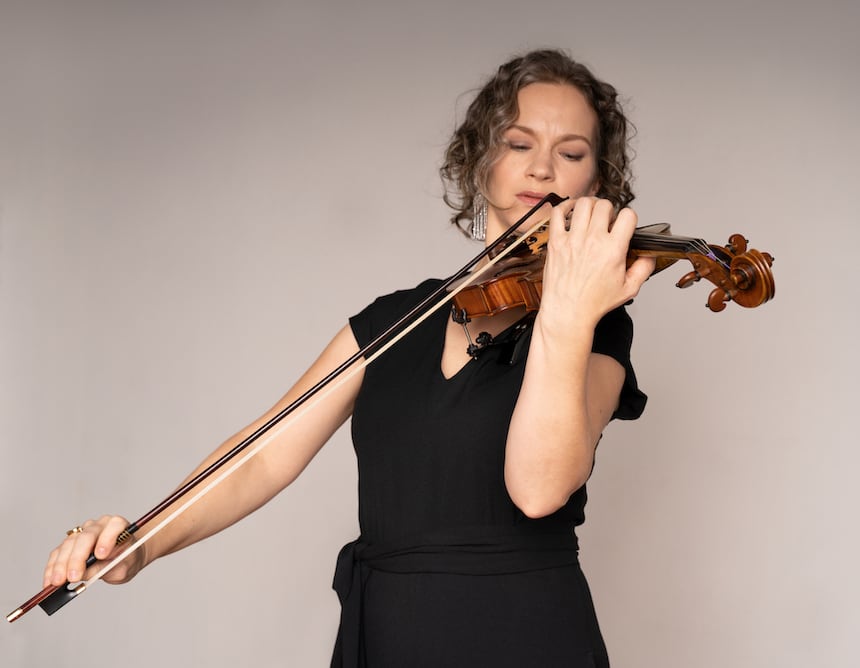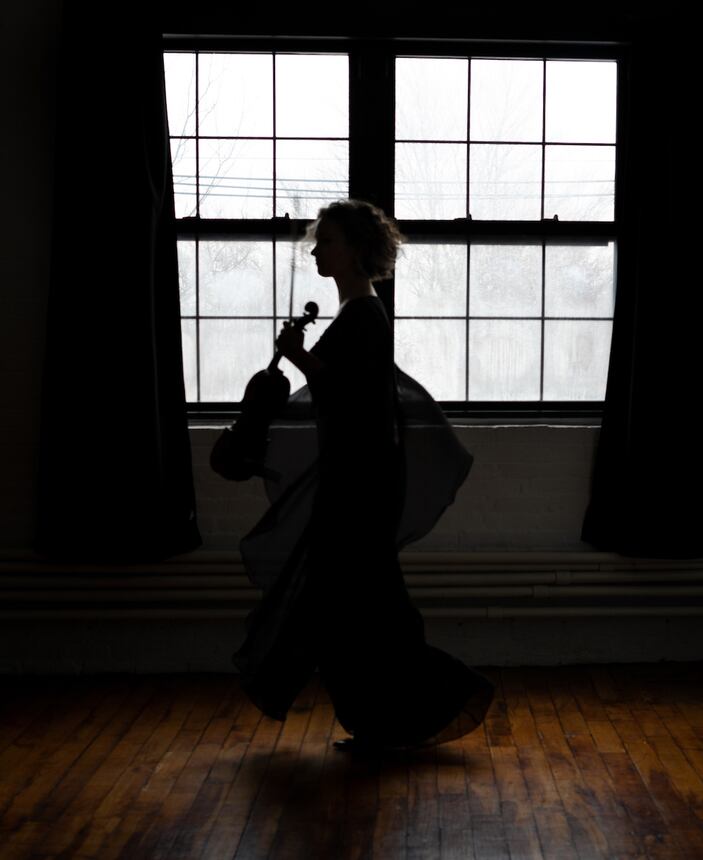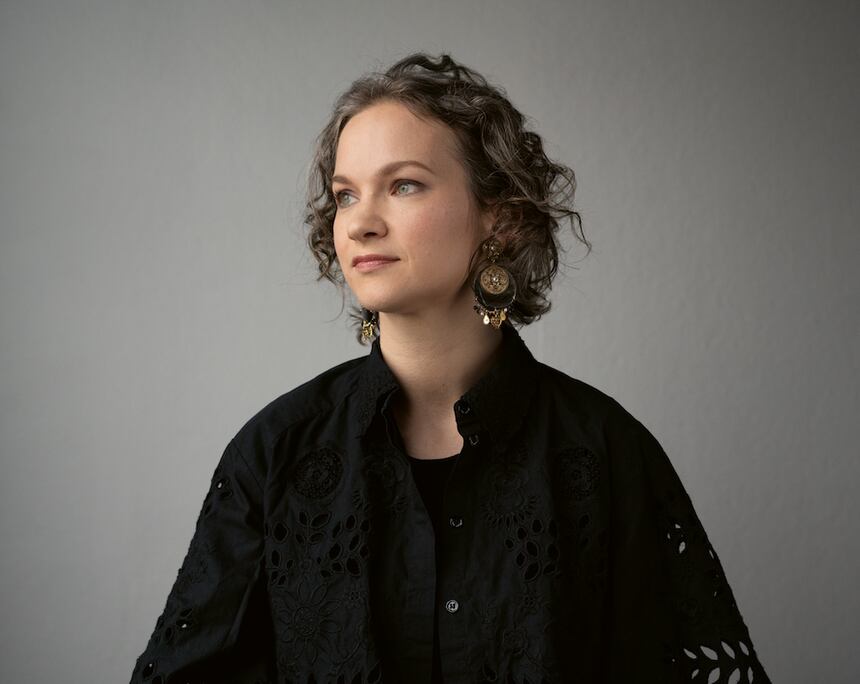Hilary Hahn looks at us through the laptop camera with a beaming smile, and she has every reason to: In addition to a long-awaited mini-European tour, her new album Eclipse will be released in a few days. A project with which she has gone through "thick and thin" - or as she describes it: "It was like a trial by fire!''
Reflecting back on the past from the present moment, everything has found its way. Sometimes it takes unplanned events to make you recognise "the essentials" again. However, there is denying the fact that the last two years marked a significant break in the violinist's musical career. A one-year sabbatical turned into almost two years without performance and musical isolation. A planned tour for the live recordings for Eclipse with the Frankfurt Radio Symphony Orchestra and conductor Andrés Orozco-Estrada turned into an artistic evolution that led to the questioning and rediscovery of herself.
The fact that she is holding the album in her hands today is anything but a matter of course for Hilary Hahn, and that is why she celebrates this release all the more. We were allowed to become part of this celebratory moment and ask the artist a few questions...
This album was a huge (and probably very challenging) project which almost didn't even happen. Now you're here and you have it in your hands. Looking back on it, how do you feel?
I feel like this was an album where I went through a lot of artistic evolution making it. But I had all of the tools to go through that evolution, I just didn't know I had them. And so it's really nice to see that it exists and to be out performing again. It still feels special outside of the context in which it was made, as well.
It seems like the album unintentionally became a pandemic project: one through which you could rediscover yourself musically. You wrote a very beautiful, honest—albeit self-critical—text in the booklet, where you said: “Discovering my voice felt like the time following an eclipse.” Could you tell us more about rediscovering your voice and why you felt it was so necessary for you?
I think actually, this is a ‘reemerging’ project, not a pandemic project so much. It was shaped by lockdowns, but it captures that moment when musicians come back together: when we join our voices together, and then enter into the joy of making music–the power of making music. I don’t consider the text I wrote as ‘self-critical’. I think it describes the process of feeling more empowered in my music making, because I was playing music by myself for so long. I was the only person in my house who plays music, so I didn't hear any other musicians either. I was meant to be on sabbatical for a year, but half of that was impacted by COVID. Most of my next season was cancelled, and by the end of that season, I hadn’t been on the road at all. So I went to Europe and did this recording in two trips. The works by Ginastera and Sarasate were new to me during those sessions. I'd prepared them but… for me, pieces always reveal themselves when I play them in concert for the first time. The mics were recording for that first concert, so the pieces were revealing themselves under a really intense focus. I really trusted my colleagues, and their partnership, to bring me through on that journey.

Can you tell us how the idea for this album came about and how you chose the repertoire? It’s not exactly the most ‘conventional’ selection...
I fell in love with the Ginastera Violin Concerto, I fell into obsession (laughs). I couldn't let the thought of it go. I don't remember how I first came across it. One day it was there, but I have no recollection of that introduction. I just knew how I wanted to play it. It's from the 60s and, you know, Ginastera isn't alive anymore. But it's almost like a premiere because so few people play it. I'm currently the only soloist playing it in the world, so it felt like it was written for me when I heard it. I knew how it was for me and I knew what I wanted to show in it—I could see that it was brilliant. And then the more I worked on it, the more I found… what a genius composition. Just the whole layering of the thought process and the writing is phenomenal. So my obsession turned out to be right (laughs). And so I was thinking: what colleagues can I record this with? I've toured with the Frankfurt Radio Symphony across the world and I played with them for decades, so there was that long history. I know their personality and other abilities, I know their strengths. I thought that it'd be great for that piece. Also, I've worked extensively with Andrés Orocso-Estrada over the course of the past decades and I know his strength and his partnership. So it's really great to work on a piece as complex as Ginastera with colleagues who dive all the way in and who are great with contemporary music, like the technique of playing this music, the colors, and melding textures together that are seemingly unrelated. Seeing the individual and the group together, that’s super important for the Ginastera. And one reason for the Dvořák is the way the orchestra creates tone; the way they play with a combination of rhythmic freedom and grounding is really great for the Dvořák. Andrés had delved into the symphonic cycle, and loves Dvořák and I had also been thinking about recording it for a while.
Sarasate—I loved that piece, but I never learned it (laughs). I’d actually planned a whole season of concerts of Ginastera and Sarasate but they all got cancelled up until the recording sessions. So that's why I did the sessions first, otherwise I would never do that! But on the other hand, it added a freshness and this sort of heat to the pressure and the intensity of the recording session. The Sarasate is so fascinating as a piece historically and musically. It's also written brilliantly for the violin as an instrument. The situation of it being an arrangement and a reimagining of the arias by a single character, as well as some of the orchestral music in the opera—both are really interesting to me. Andrés has done a lot of opera, so he was a really good colleague for this one. We've formed many interpretations together over the years and he knew the way the words and the instrumentals tie in within the opera, and that's what I wanted to achieve. We were able to get to the core of it in just a couple of days on the spot. I just knew that adding the abilities of the orchestra to those two concerti would really tie the virtuosity with the musicality.
The interpretation of the violin concertos — the combination of the orchestra and the soloist — are very different from that of Sarasate's “Carmen-Fantasy”. Do you approach these pieces differently?
I'm trying to compare them because with the concerto, the source material is what you're playing. If it's an older concerto, there are traditions that you make decisions about. Do you follow the tradition? Do you differ; do you not think about it and just replay what's embedded in you with your own version? The things that are comfortable or not comfortable on the instrument were the original material, and therefore there's sort of a reason for them to be that way. So you can think about how you're being choreographed as a player. And what does that mean emotionally, technically or physically? With the Sarasate, the thing is, he was a great violinist. He was also very proud of his Spanish identity, which is the source of a lot: the musical forms that Bizet, the French composer, used for the opera Carmen in French. Sarasate actually knows the source material so well: he writes an original work for the violin and the technique is very much violin technique. It's not like he took the opera and put it on violin. He did with the melodies, but he did it in such a way that it feels like original violin music. So there is this decision in that case, do you make it harder for yourself violinistically by thinking about the words, the mood, the accents, the tempi of the opera? Or do you dive all the way in to playing it as a violinist and everyone will know the references anyway? So, I always like a challenge (laughs)! Let me do the violinist stuff! But at the same time, let's see if we can get as close to the original intention of the opera as possible. It was figuring out where the articulations are in the singer's voice and trying to find out how to translate that onto the violin.
Everything on the album is recorded live—even the first piece, despite the lack of an audience. Do you prepare differently for live recordings than for studio recordings?
Live recordings can capture those really unusual sparks or moments that happen during the performance that you can't generate. There's a mentality shift. Also you have adrenaline in your system, which is a hormone that changes everything in your brain and how your body reacts or how you notice things. So there is an element in live performance that is great, but you also can't schedule that (laughs). You can't pick your day when everything works together, so you have to be comfortable skating on the edge. You have to know your baseline collaboration and what you can lean into, in any performance with those colleagues. But when I was preparing the recording I didn't know my own baseline anymore, because I've been off the stage for so long. So it was about trying to just trust that whatever was there was solid and also valuable; that whatever had evolved for me would show up. That was a really valuable lesson. I already knew it, I just had to believe it. I was being pushed to the edge and was so at the edge of my abilities at that crucial moment when we were all reviving. It was really great to have the recording be captured as live as it was, because it really was that moment when the match strikes. And hearing everyone playing together just brought the world back into technicolor.

Another thing that happened over the course of the recording was a live stream for the public. That was actually my first live stream ever. So with my colleagues in concert dress, with an audience listening live, that to me was also a revival. Then, when I came back for the second performance, which were the Ginastera and Carmen, I found out the week that I was recording Dvořák that we would probably be able to be in the Alte Oper in Frankfurt! It was also going to be planned as Andrés’ final concert as music director, so not being in the opera house would have been a little bit sad. But right before the week when I was going to be there, I heard that they had to restrict the audiences again, so we did two concerts instead of one. You see, it was this constant shifting scenario with the fact that we were on stage and we were playing in front of audiences. It's kind of like a trial by fire, except there wasn't much trial. In the end, it was just being forged into something stronger.
When you think back to that particular time, were there any special people or events that encouraged you?
When I said that the recording almost didn't happen, I actually cancelled so as either to play and to push it a little bit further, or to rethink it and come at it from a different direction. I actually thought that I was at my limit and this wouldn't be a reliable enough situation and that I would not be able to be sure that I was making the recording I wanted to make. But my manager helped me - we talked it through and she knows me really well. And I also talked it through with Andrés and with a couple of friends. The really helpful thing was that everyone said: “This doesn't have to happen. It's up to you. But if it happens, you can trust everyone who's there.” And this was true, so I thought, let's just do it. Let's just see what happens. And then I went from crazy to super focused (laughs). I think the super focus was also something that made the recording so special, because I had nothing else going on. I just dived in really deeply to the pieces with that one goal of that one particular concert.
If the whole pandemic didn't happen, do you think you would have made the same musical evolution?
I would have gotten there, maybe even slower. I was already on this path. Actually, what happened was the purpose of my sabbatical even though I didn't know it. So my break was to understand where I am as an artist now—by stopping. When you stop, you can take out the busy work, you take out the projects you're so excited about: that you plan two years in advance; that lead to more things that you plan, and to more things… and then you're 10 years down the road, but you haven't completely reassessed whether everything that you're doing is everything you want to be doing, or everything you don't want to be doing. Because you evolve as a person through these projects and through these experiences. I tried to just step away sometimes to reset and just check in with myself. So ultimately, that's what the sabbatical was about. But also in the States there was simultaneously with the pandemic a lot of social justice realizations for a lot of people, a lot of revelations and wake up calls for people who hadn't been mentioned. I also learned a ton and I decided to stop a lot of my own work to just understand things better, because I think the arts are for everyone. They're for all the voices, and they should express the times that we live in. They should reach people wherever they are.

I felt it was imperative to explore where my gaps of awareness were, and try to understand the landscape of people better. I took probably six months to just focus on that. And that was challenging, also during lockdowns to be in that place—in the lockdown space—I have two little kids, so it was emotional and I did not have the outlet of performing. I think it helped me go through all of those processes, but also made it sort of a pressure cooker. Performing is where I process everything that's happening. That's where I sort things through, where I clear things out; that’s where I express, where I connect, where I check in with my evolution. And without that for almost two years… I kept looking for places to release the experiences and turn them into something new, but I didn't have any place. So it just got muddier and muddier for me. And with this break it was all very clear whatever I learned: what my drive was, what my mission is, what my reason for performing is. I always thought that there was probably something else I could do, that would be the same. I tried everything I could think of but nothing really was the same. For me, it was a sort of existential realization that this is really who I am, and that this is really what I need to be doing. This added to a greater sense of connectedness to the world.
